
Cotabato or North Cotabato, officially the Province of Cotabato, is a landlocked province in the Philippines located in the Soccsksargen region in Mindanao. Its capital is the city of Kidapawan. Some of its barangays are under the jurisdiction of the nearby Bangsamoro Autonomous Region.

The Autonomous Region in Muslim Mindanao was an autonomous region of the Philippines, located in the Mindanao island group of the Philippines, that consisted of five predominantly Muslim provinces: Basilan, Lanao del Sur, Maguindanao, Sulu, and Tawi-Tawi. It was the only region that had its own government. The region's de facto seat of government was Cotabato City, although this self-governing city was outside its jurisdiction.
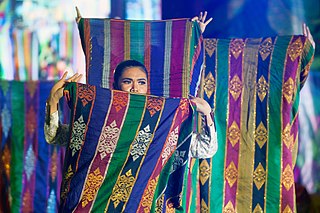
The Maranao people, also spelled Meranao, Maranaw, and Mëranaw, is a predominantly Muslim Filipino ethnic group native to the region around Lanao Lake in the island of Mindanao. They are known for their artwork, weaving, wood, plastic and metal crafts and epic literature, the Darangen. They are ethnically and culturally closely related to the Iranun, and Maguindanao, all three groups being denoted as speaking Danao languages and giving name to the island of Mindanao. They are grouped with other Moro people due to their shared religion.
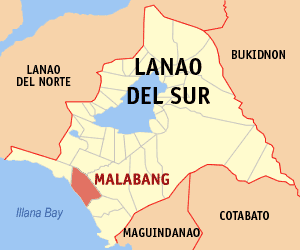
Malabang, officially the Municipality of Malabang, is a 3rd class municipality in the province of Lanao del Sur, Philippines. According to the 2020 census, it has a population of 49,088 people. The town is one of the two former capitals of the Sultanate of Maguindanao from 1515 until the Spanish conquered the land in 1888, and later became the capital of one of the states of the Confederation of Sultanates in Lanao in 1640.

The Moro people or Bangsamoro people are the 13 Muslim-majority ethnolinguistic Austronesian groups of Mindanao, Sulu, and Palawan, native to the region known as the Bangsamoro. As Muslim-majority ethnic groups, they form the largest non-Christian population in the Philippines, and comprise about 5% of the country's total population, or 5 million people.

The Moro National Liberation Front is a political organization in the Philippines that was founded in 1972. It started as a splinter group of the Muslim Independence Movement. The MNLF was the leading organization among Moro separatists for about two decades beginning from the 1970s.
Haroun al-Rashid Lucman was a Filipino legislator, journalist, World War II guerilla hero, and an early proponent of Moro independence or autonomy.

Ansaruddin Abdul Malik "Hooky" Alonto Adiong is a Filipino politician serving as mayor of Ditsaan-Ramain, Lanao del Sur since 2022. Previously, he was the representative of Lanao del Sur's 1st district (2013–2022). He was elected vice governor of the Autonomous Region in Muslim Mindanao (ARMM) in 2005. After Governor Zaldy Ampatuan's removal from office in 2009, Adiong became the acting governor until 2011.
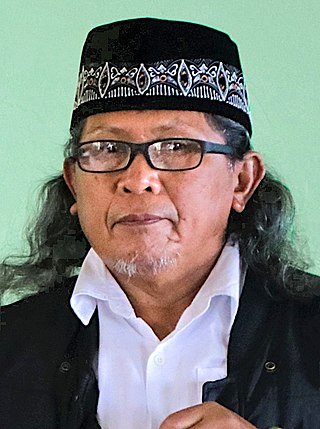
Abdullah Goldiano Makapaar bin Sabbar, commonly known by his nom de guerreCommander Bravo, was a former Moro rebel in the Philippines who fought under the Moro Islamic Liberation Front (MILF) as a commander.

Bangsamoro, officially the Bangsamoro Autonomous Region in Muslim Mindanao is an autonomous region in the Philippines, located in the southwestern portion of the island of Mindanao.
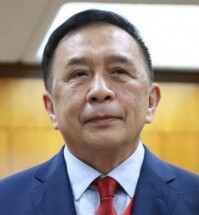
Saidamen Balt Pangarungan is a Filipino businessman, lawyer and politician who previously served as the ad interim Chairman of the Commission on Elections from March–June 2022. He previously served as the secretary of the National Commission on Muslim Filipinos in the Duterte administration, and was the governor of Lanao del Sur from 1988 to 1992.

The Bangsamoro are a majority-Muslim ethnic group occupying a range of territories across the southern portions of the Republic of the Philippines. On three occasions, a short-lived and unrecognized Bangsamoro state independent of the Philippines has been formally declared by the Moro National Liberation Front (MNLF). The first declaration was issued in 1974, amid the Moro conflict. Bangsamoro Land would be declared in 2012. In 2013, the United Federated States of Bangsamoro Republik was declared.

The Bangsamoro Organic Law, also known as the Bangsamoro Basic Law (BBL), and officially designated as Republic Act No. 11054, is a Philippine law that provided for the establishment of the Bangsamoro Autonomous Region in Muslim Mindanao (BARMM).

An autonomous region of the Philippines is a first-level administrative division that has the authority to control a region's culture and economy. The Constitution of the Philippines allows for two autonomous regions: in the Cordilleras and in Muslim Mindanao. Currently, Bangsamoro, which largely consists of the Muslim-majority areas of Mindanao, is the only autonomous region in the country.

The 1976 Tripoli Agreement was signed on December 23, 1976 in Tripoli, Libya by Carmelo Z. Barbero, representing the Government of the Philippines and Nur Misuari of the Moro National Liberation Front. The agreement defined autonomous administrative divisions for Muslims in the southern Philippines, the establishment of an autonomous government, judicial system for Sharia law and special security forces, and the observance of a ceasefire. The autonomous region was to have its own economic system, including an Islamic bank.
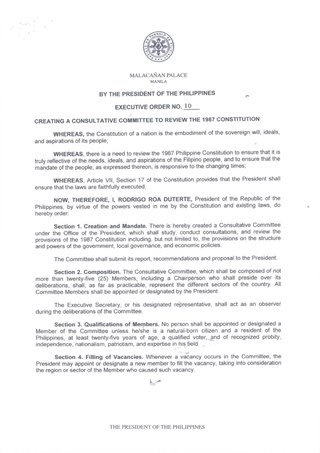
Executive Order No. 10 was signed on December 7, 2016, by Philippine President Rodrigo Duterte which created a consultative committee to review the 1987 Constitution of the Philippines. The move officially set in motion the process for amending the 30-year-old charter and set up a federal system of government in the Philippines aimed at ending the Moro conflict and further opening up of the Philippine economy.
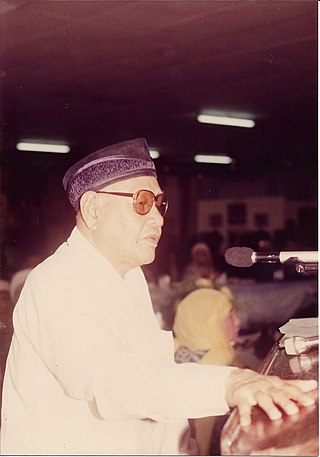
Ahmad Domocao "Domie" Alangadi Alonto was a Muslim-Filipino lawyer, educator, author, traditional leader, and Islamic figure from Lanao del Sur.
Laisa Masuhud Alamia is a Filipino politician and lawyer who is a member of the interim Bangsamoro Parliament. She is also the Minority Leader of the regional parliament.

The speaker of the Bangsamoro Parliament is the presiding officer of the Bangsamoro Parliament, the regional legislature of Bangsamoro Autonomous Region in Muslim Mindanao (BARMM) of the Philippines.
















